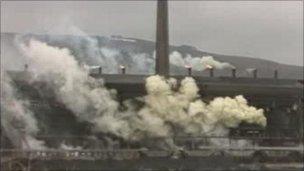Phurnacite plant, Abercwmboi: Workers' High Court win
- Published
Workers at a now closed smokeless fuel plant were made ill by their place of work, the High Court has ruled.
The men said making the fuel at the Phurnacite plant at Abercwmboi, Rhondda Cynon Taf, left them with lung cancer and respiratory disease.
Four of 183 ex-workers with claims won compensation between £120,000 and £4,500 after claiming British Coal failed to provide necessary protection.
Lawyers say the judgement could affect hundreds of workers throughout the UK.
The workers had put forward claims for lung, skin and bladder cancers and chronic obstructive pulmonary disease.
Eight former staff brought a test case to the High Court on behalf of 183 workers who submitted a joint claim. The judgement will now be applied to the other claims in the group to see if they fit the criteria for payouts.
Kathryn Singh, a partner at Hugh James solicitors who represented the claimants, said: "Cancer cases are always emotive but, sadly, difficult to prove to the standard required by law.
"This is largely due to cancer being a disease of the general population, and proving that it has been caused by specific circumstances, such as working conditions, is extremely difficult."
The ruling by Mrs Justice Swift found there was convincing evidence that diseases of the lung, namely COPD, emphysema, chronic bronchitis and lung cancer could be caused by the processes at the plant, near Mountain Ash.
However, there was insufficient evidence for the court to find that, on a balance of probabilities, bladder cancer and certain types of skin cancers were caused by these processes.
'Pretty dreadful' conditions
The site, which shut in 1991, produced smokeless fuel in the form of briquettes for 50 years. At its peak over 1m briquettes were produced a year.
The judge found there had been serious concerns about the dust and fumes produced by the manufacturing process and emitted from the plant into the surrounding atmosphere.

More than 1m smokeless fuel briquettes were produced a year at the plant's height
She said: "In the pitch bay where, until the late 1970s, solid pitch was broken up by hand, the conditions were described by a former member of management as 'pretty dreadful', an assessment with which I agree.
"The dust and fumes to which men were regularly exposed contained substances which were known to be harmful, indeed carcinogenic.
"Conditions in most parts of the Phurnacite plant remained very poor right up to the time of its closure in 1990.
"Some improvements were made over the years and I have no doubt that there were individual managers who did their best to effect changes to the working conditions at the plant.
"However, overall, I found that the attitude of the management to the safety of its workforce appears to have been reactive, rather than proactive."
Mrs Justice Swift found the plant to be in breach of its statutory duties towards its workforce.
Bleddyn Hancock of the mining deputies' union Nacods, which supported the claimants, said: "The people of the Aberdare valley have long known that the filth of the Phurnacite plant damaged health.
"This is the seventh and only successful attempt to hold British Coal who owned the plant to account.
"Now many men and their families will be compensated for the devastating effects of respiratory disease and lung cancer."
- Published17 October 2011